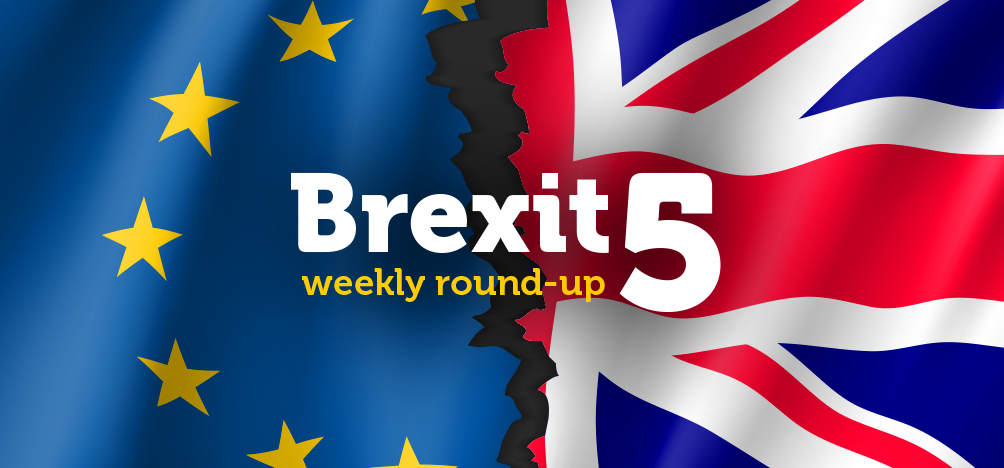It’s Friday again and with 63 days to go until the end of the Brexit transition period, I assure you that weeks are going by much faster for Mr Frost and Mr Barnier than they are for the rest of us. Running against a ticking clock, both sides now seem more optimistic about striking a deal, though the substance and breadth of a final agreement remain to be seen.
To help you cut through the noise, the Whitehouse team has prepared an overview of this week’s top 5 Brexit developments. Enjoy!
Dear or no deal?
Talks between London and Brussels have now reached the “tunnel” stage, whereby negotiators from both sides rush to try to seek agreement on the remaining details of the deal, away from the glare of media and commenting politicians. Charles Michel, the President of the European Council, stated that the next two weeks will be crucial, as negotiations enter their last and most difficult phase, suggesting that a deal should not be taken for granted. Both sides have until mid-November to reach an agreement, the deadline to ensure a deal can be ratified in time in both Strasbourg and Westminster.
Is this all about fish?
A remaining and highly contentious point in the negotiations is the future level of access to British waters for European vessels, a major talking point in the push to ‘take back control’ proclaimed by pro-Brexit campaigners in 2016. Fishing rights might just be the only point where the UK has the upper hand, as a no-deal outcome could block European fishermen from reaching British waters. Throughout the negotiations, the UK was clear that it sought to reduce access to French, Belgian, and Dutch fishermen to British fishing stocks.
In a letter sent this week by Michael Gove to Jeremy Miles – the Welsh Minister for European Transition who raised concerns over the UK’s strict negotiation position – Gove reiterated that the UK will not back down on its stance on fisheries for the sake of an agreement.
Things are not so simple, however. The UK exports the vast majority of the fish it catches to European markets, and imports much of the fish it eats from foreign partners (cod and haddock don’t swim in the Channel), meaning a no deal would leave more fish to be caught by British vessels, but with nowhere for them to send it to. To make everyone (mostly Emmanuel Macron) happy, the UK government has proposed a transitory solution to fishing quotas, whereby British fishing quotas would gradually be increased at the same rate as European quotas would be reduced, allowing continental fishermen to have time to adapt to the new Brexit reality.
Can you still go on holiday?
This week, a YouGov poll showed that two-thirds of people in the UK are still unclear over the practical implications of Brexit. The survey found that confusion remains over the new rules on travelling and doing business in the EU, with only 9% of respondents aware that from 2022 Britons will be required to pay for an “electronic authorisation to travel” in order to cross EU borders, while 48% were not aware that British passport holders will no longer be able to use EU, EEA and Swiss passport lanes at airports and border crossings.
Remember Gibraltar?
The British rock to the South of Spain is working to reduce the impact of Brexit on its economy, which relies on almost 15,000 cross-border workers for nearly half of all jobs in the territory. In last-minute talks with the Spanish government, Gibraltar is seeking to join the EU’s Schengen free-movement area as well as the blocs’ customs union – effectively seeking closer ties with the EU than it has ever had before. A more European Gibraltar would be a de facto win for the Spaniards, who for centuries have disputed the territory’s British sovereignty.
Does Brexit mean… chlorinated chicken?
The government’s reassurance that the UK will continue to uphold high food and environmental standards does not yet convince British farmers, after Number 10 refused to enshrine its promises into law as part of the Agriculture Bill. The government was defeated in the House of Lords, where Peers opposed the government’s stance and voted to ensure future trade deals comply with current UK animal welfare and food standards (which mostly emanate from Brussels). The Bill is now set to return to the House of Commons next week.
In advance of the discussions in Westminster, dozens of farmers circled Melton Mowbray to protest over their concerns for the government’s post-Brexit plans, fearing the government will concede to lower food standards as part of broader trade deal negotiations with countries like the United States.
Celebrity farmers like Jimmy Doherty and Helen Browning have also joined the efforts to protect the UK market from products like chlorinated chicken and hormone-fed beef, writing to every MP and urging to ensure the competitiveness of British farming is protected after Brexit. It will now be up to the government to decide whether to U-turn on the contents of the Agriculture Bill, or face the growing public opposition and even the disapproval of Jamie Oliver.
The Whitehouse team are experts in the potential impact of Brexit, providing political consultancy and public affairs advice to a wide range of clients across the Member States of the European Union and the United Kingdom. More information about our Brexit experience can be found here, or, if you have any questions, please contact our Chair, Chris Whitehouse, at chris.whitehouse@whitehousecomms.com
